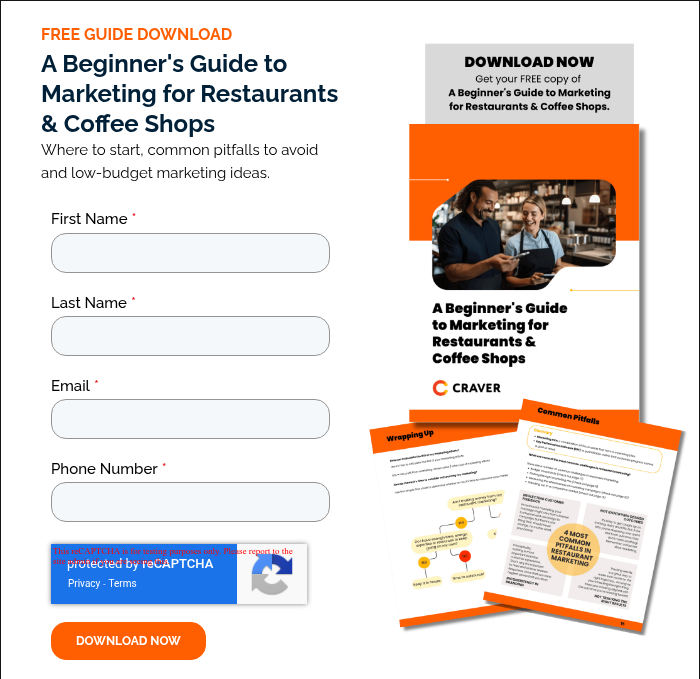A Beginner's Guide to Marketing for Restaurants & Coffee Shops
Restaurant owners are responsible for so much more than simply “owning” a restaurant.
Managing employees, dealing with finances, handling operations, and developing menus.
While this unwavering sense of commitment is one of the things we respect most about restaurant owners… we also know it can lead to some tricky decisions.
Because, when you’re juggling never-ending “To-dos” and constantly competing priorities…
When you’re always short on time, energy, and resources (or all three)…
When you have employees to pay and operations to sustain…
You have to pick and choose what to focus on.
And restaurant marketing usually loses that coin toss.
But why?
Well, it’s not because marketing doesn’t work.
(80% of restaurant owners think digital marketing is “vital for survival and growth.”)
And it’s not because your customers don’t like marketing, either.
(45% of U.S. diners have cited social media as the reason for trying a new restaurant.).
It’s because restaurant marketing is just too unfamiliar.
It’s an abstract, intimidating, and overwhelming concept that restaurant owners are just too dang busy to add to their plate.
We hear you.
But it doesn’t have to be like that, y’know.
This guide is here to show you that.

The “Why” Behind the Guide
A Beginner's Guide to Marketing for Restaurants & Coffee Shops is for restaurant owners and managers who want to start marketing their restaurants, but aren’t quite sure where to begin.
Developed in collaboration with Deena McKinley – the Managing Partner and Founder of Maverick Marketing Solutions, LLC – this guide will take you through everything you need to start marketing your restaurant, from definitions and finances to strategies and first steps.
By the end of this guide, you’ll understand:
- The basics of local restaurant marketing
- What you need before getting started
- How to develop a marketing plan for your restaurant or coffee shop
- Common pitfalls and mistakes to avoid
- What ideas are easy/inexpensive to start with
- 3 things you can easily start doing today
- How to look ahead/evaluate success
So, without further ado…
Let’s start marketing your restaurant, shall we?
Section 1: The Basics of Local Restaurant Marketing
Glossary
| Return on Investment (ROI) | A metric that demonstrates how effectively money has been spent depending on what results were delivered. |
| Trade Area | The three-mile radius surrounding a restaurant’s location |
| Top of Find | The need for restaurants to maintain a high-ranking digital presence on search engines, making it easy for customers to find them via internet search; a play on the phrase “top of mind”. |
What is local restaurant marketing?
Local restaurant marketing refers to the tactics and strategies that restaurant owners can use to promote their businesses within their trade area.
The goal of local restaurant marketing is to build (and/or increase) local awareness of your restaurant, attracting new customers and building stronger connections within your neighborhood and community.
Why does marketing matter to restaurants/restaurant owners?
Local restaurant marketing is important for restaurant owners for a few reasons.
- It attracts your target audience
- It increases your visibility
- It differentiates you from your competitors
- It connects people to you/your restaurant
Effective marketing strategies can also improve your restaurant’s credibility and reputation, build customer loyalty, and ensure you stay on top of find online.

Section 2: What You Need to Know Before Getting Started
Glossary
| Gross sales | The money your business makes before subtracting expenditures. |
| Marketing Spend | The money your business puts toward marketing efforts. |
| Historical Results | Information/statistics/data collected from past events, initiatives, and efforts; used to inform predictions about future trends and performance. Also called "historical data". |
When should I start marketing my restaurant?
You should start marketing your restaurant as soon as possible!
If your restaurant is brand new, you should start marketing as soon as you have confirmation that you’re on track to open. If your restaurant is already open but you haven’t started marketing, consider this your sign to start now!
It’s never too early (or too late!) to start restaurant marketing.
How much should I spend on marketing my restaurant?
Much like no two restaurants are the same, no two marketing spends are the same, either.
Every restaurant’s marketing spend is influenced by several highly variable (and highly individualized) factors, including:
- Your restaurant’s location
- Your restaurant’s competition
- Your restaurant’s target audience
- Your restaurant’s specific marketing goals
To calculate a tailored marketing spend for your restaurant, you’ll need to look at:
- Historical revenue data
- Projected sales
- Specific marketing goals
- The cost of different marketing channels
- The expected ROI from each channel
Generally speaking, putting 3-6% of gross sales toward marketing is a good rule of thumb.
Where should I start when it comes to local restaurant marketing?
Before you start marketing your restaurant, you need to be able to answer the following questions about your restaurant.
1. Brand Information
- What is your brand identity?
- Who are your competitors?
2. Historical Results
- What marketing has worked in the past for you?
- What marketing has worked in the past for your competitors?
3. Target Audience
- Who are your best customers?
- What matters most to them?
- What need do you fulfill for them?
- What platforms/channels do they hang out on?
4. Measurable Goals
- What are your (clear and measurable) marketing goals?
- How will they be measured?
5. Tracking and Analysis
- How will you track your goals over time?
- What will you do with that information?
Knowing and understanding how each of these topics is key when developing a strong marketing strategy (but more on that in Section 6).
Section 3: How to develop a marketing plan for your restaurant or coffee shop
Glossary
| Outcome | A development that, if achieved, indicates success in your business |
| Marketing channel | A medium that you use to communicate with your customers. Examples: social media, email marketing, networking events, word of mouth. |
| Content | Information (text, images, video, or audio) designed to provide value Examples: blogs, social media posts, YouTube videos |
| Content Calendar | A schedule that dictates how/when/where you publish content. Also called an "editorial calendar". |
What is a restaurant marketing plan and why do I need one?
A restaurant marketing plan is a strategic framework that guides all marketing efforts to ensure they align with your business goals and target audience. Think of it like a marketing roadmap, designed to promote your restaurant’s growth, enhance visibility, and maximize profitability.
A strong restaurant marketing plan typically includes a few key components:
- Market analysis: An exploration of your market/competitors/customer demographics
- Brand positioning: A definition of what makes your restaurant unique
- Marketing goals: Your restaurant’s specific, measurable objectives
- Marketing strategies: The tactics you will use to achieve your goals (i.e.social media marketing, email campaigns, local SEO, community engagement, etc.)
- Budget: an overview of how much you are willing to/can afford to invest in marketing
- Monitoring and evaluation: An overview of the metrics you’ll use to measure the effectiveness of your marketing activities
Now, if you’re a restaurant owner interested in scaling or growing your business, then developing a marketing plan just became a non-negotiable… and here are 5 reasons why.
1. A marketing plan keeps you focused
A marketing plan helps your efforts stay focused and aligned with your overall business objectives. It also prevents wasteful spending on ineffective tactics and ensures every marketing dollar you spend directly supports your strategic goals.
2. A marketing plan helps with customer acquisition
In the (highly competitive) restaurant industry, good food isn’t enough for strong, sustainable customer acquisition. A marketing plan helps you systematically (and consistently) attract new customers with strategies to keep them coming back.
3. A marketing plan gives you a competitive edge
As a restaurant owner, you know how difficult it can be to prioritize marketing. That’s why putting the effort into a strong marketing plan gives you a competitive advantage over other restaurants that can’t – or won’t – make time to do the same thing.
4. A marketing plan keeps you adaptable
Markets are constantly changing, with trends and preferences evolving almost daily. A marketing plan helps you stay flexible and on track, making it easier to respond dynamically and stay ahead of the curve (and your competitors).
5. A marketing plan increases profitability
If we’re talking bottom line, then the main reason you need a marketing plan is because it’s profitable. A well-crafted marketing plan optimizes your marketing spend, helping you focus your efforts on high-ROI activities that actually make you money.
What makes a good local restaurant marketing plan?
The recipe for a good restaurant marketing plan has a few key ingredients.
1. An outcome/goal
A good marketing plan has a specific outcome. Work on identifying one main outcome (and what that outcome looks like for you) before moving on to anything else.
→ Ask yourself, “What’s one big outcome I want to accomplish?”
2. A target audience
A good marketing plan has a clear audience. Think about what those customers want, what they value, what they’re struggling with, and how your restaurant is their solution.
→ Ask yourself, “Who are my very best customers, and why?”
3. A target channel(s)
A good marketing plan has a target channel (or multiple). Figure out what channels your target audience uses and generate your content to meet them where they’re at.
→ Ask yourself, “Where are my customers already spending their time?”
4. A content calendar
A good marketing plan has a guide for content creation. Best practices vary from channel to channel, and a content calendar keeps your marketing on track and in line.
→ Ask yourself, “What kind of content works best on my channels?”
5. A tracking process
A good marketing plan has a way to track and analyze performance. Determine the metrics you’re measuring, a sustainable way to track them, and how to learn from the data afterward.
→ Ask yourself, “What metrics am I trying to measure, and what can I learn?”
What marketing channels should I be exploring?
The marketing channels your restaurant should be exploring depend on what channels your target audience is using.
However, here are some common channels that many restaurants find effective:
- Social media: Instagram, Facebook, TikTok
- "Traditional" media: Radio
- Google Business Profile
- Email marketing*
- Local sponsorships
- Local collaborations
*Tip: Always prioritize avenues that allow you to “own” your audience (like email marketing, but more on that in Section 5!)
Want to keep reading? Download the full guide below.👇

About the Author

Deena has over 20 years of experience working with leading QSR and Fast Casual brands, helping restaurants create data-driven marketing and digital strategies to increase customer engagement and improve financial performance. As Chief Experience Officer for Papa Gino's Pizzeria and D'Angelo Grilled Sandwiches, two iconic New England brands with a combined 150 locations in the Northeast, Deena oversaw the digital, strategic marketing, technology, catering, and guest experience teams, leading the digital transformation of these legacy brands through the implementation of a new online ordering platform, app, and loyalty experience. Previously, Deena was Chief Experience Officer at Mobivity, providing multi-unit restaurants like Subway, Sonic, and Dairy Queen a platform to increase retention, guest engagement, frequency and spend. Deena was also Chief Client Officer at Zimmerman Advertising, working with restaurant clients such as Papa John’s Pizza, Boston Market, and Firehouse Subs.




